
JULIA LEE BARCLAY-MORTON – YOGA, WATER AND REWRITING AUTISM
I interviewed writer Julia Lee Barclay-Morton about her experience of autism. Julia began as an experimental dramatist in New York, moving to the UK to
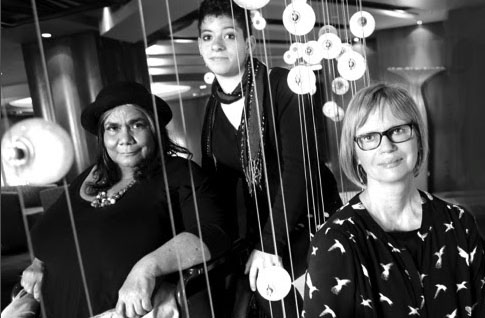
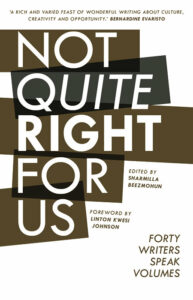
In part two of her interview author, disability activist and feminist Gaele Sobott talks about her campaigning and creative work. Gaele, who has a PhD in literature from Hull University, recently published short stories and poems in Hecate, Verity La, Meanjin, New Contrast, Prometheus Dreaming, Disability Arts Online, Cordite, the anthology Botswana Women Write (University of Kwazulu-Natal Press) and the Speaking Volumes UK anthology Not Quite Right for Us (flipped eye publishing).
In her answers, Gaele describes her organisational and personal experiences as a disabled person, her intersectional work with the local community and the importance of artistic control in realising the creative potential of marginalised groups.
Leslie: Tell us about Outlandish Arts that you creatively direct. What challenges have you faced and how have you dealt with them?
Gaele: I founded Outlandish Arts in 2014 due to the lack of disabled producers and disabled-led arts companies in Australia. Our first major project was to tour a disabled-led, dance-theatre production from Scotland with Australia Council for the Arts and Create NSW support.
Our vision is a society where disabled-led art affirms its place in building a better world. We focus on D/deaf and disabled artists across all art forms, seek funding to assist them in making art and provide platforms for their art.
We are a small organisation with limited capacity in terms of staff and resources. At this point, we intend to stay small, focusing on purpose and vision, quality over quantity, depth over breadth. It is not easy. We do not receive operational funding from the government and only pay our staff from project to project. We only keep our head above water due to the passion and dedication of volunteer labour by receiving in-kind assistance and giving in-kind assistance. We have developed robust collaborative networks with D/deaf and disabled artists and organisations. We work locally, regionally with the likes of Twist Factory in Narooma and the Eurobodalla Shire Council, interstate partnering with Access2Arts and other arts organisations, and overseas working with artists like Colin Hambrook from Disability Arts Online in the UK, disabled artists and academics Abhishek Anicca and Shilpa Das in India and Nolan Stevens in South Africa.
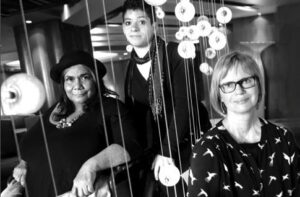
We have benefited from collaborations with the State Library of NSW, the Art Gallery of NSW, the University of Technology Sydney, Leo Kelly Blacktown Arts Centre and The Studio technology hub.
We are currently working on our first virtual reality project called FIRE, supported by Create NSW. Early in 2020, we filmed the burned forests near Moruya and Batemans Bay with a 360-degree camera. We’re using some of this footage and game engine technology to create an interactive virtual reality platform. We are passionate about leading through our art to assist in determining future action around the ongoing climate emergency and other crises we expect to experience. We are also in the first stages of developing software so that disabled artists may work together remotely on projects. We are continuing Chinwag, a series of videos where disabled writers speak about their lives and work, Rhizome, which offers perspectives and work from disabled artists worldwide and ODDS-ON, which is a club night held at the Red Rattler. Our first event after COVID is a night of rear-guard and Crip art-poetry-techno where we sow the seeds for a revolutionary future, make room for joy, pleasure and rest.
Leslie: What’s the story of your experience as a ‘misfit’?
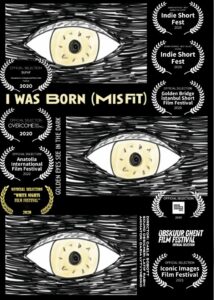 Gaele: I wrote a poem called I Was Born (Misfit) and later worked with Daria Lytvynenko to animate it. I wrote it as an act of resistance and because of my growing concern about prenatal screening and diagnosis during pregnancy and Pre-implantation Genetic screening. Today, I would probably not be born due to Pre-implantation screening. My non-existence is not necessarily problematic but preventing people from being born due to their genetic makeup is. There needs to be a lot more thought and discussion around the critical concepts and protocols involved in deciding who should not be born. Disabled people must be part of the process, better still, lead the process.
Gaele: I wrote a poem called I Was Born (Misfit) and later worked with Daria Lytvynenko to animate it. I wrote it as an act of resistance and because of my growing concern about prenatal screening and diagnosis during pregnancy and Pre-implantation Genetic screening. Today, I would probably not be born due to Pre-implantation screening. My non-existence is not necessarily problematic but preventing people from being born due to their genetic makeup is. There needs to be a lot more thought and discussion around the critical concepts and protocols involved in deciding who should not be born. Disabled people must be part of the process, better still, lead the process.
My personal experience as a ‘misfit’ is mainly that of someone who does not think or socialise in the way dominant sectors of society expect me to. I never will. It has been an uncomfortable process finding a path through dominant social behaviours that I find restrictive and annoying. I am often positioned on the outside but the outside is a space where I am also quite happy.
I am made to feel a misfit when I am medicalised. Some of my most humiliating and emotionally hurtful experiences have been at the hands of medical professionals. I move about in a mobility device, a wheelchair or scooter. So I experience quotidian irritations when people approach me on the street, in shopping centres, at events to pray for me, ask intrusive questions etc. It is evident that in their eyes, I am a misfit.
Leslie: How have local connections and interviews/investigations affected and changed you?
Gaele: Local connections are vital to me, as are broader connections. I live in Blacktown, and the Leo Kelly Blacktown Arts Centre has influenced me a great deal. It is an innovative multi-arts hub that punches above its weight in terms of the quality of work it enables and the number and diverse nature of the artists it supports. The Centre places First Nations artists and communities at the heart of its program, which means that respect and justice are also central to its operations. The Centre has gallery spaces and a performance studio, a workshop studio and other facilities. I am a member of the Blacktown City Council Arts Advisory Committee, which provides advice to the Arts and Cultural Development section and Blacktown Arts Centre regarding cultural planning, public art and the like. Working with Council and peers in the arts and cultural sector helps me gain a wider perspective on arts administration and management and a far greater understanding of community needs and potential. Given the opportunity, I believe local communities are very good at problem-solving and organising for a better society.
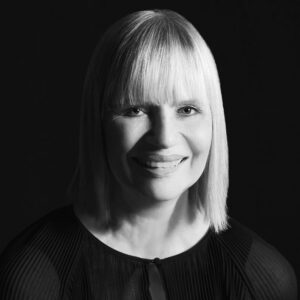
Regarding the interviews I conduct at various times, these are with people I feel have stories that offer readers historical insight and ways forward. There is a lot of grassroots activism and knowledge out there but we live increasingly isolated and individualistic lives. In terms of organising change, this does not serve us well. I publish the interviews on my blog. It is a very meagre contribution but I hope it assists in creating lines of communication between people who do not have access to information.
I suppose the primary way I have been changed by interacting with community, especially those who experience oppression, is understanding the various ways we can work with our differences and similarities. It is a continuous learning dynamic for everybody involved.
Leslie: From your experience, what can help people realise their full creative selves? What have you learned about yourself while going through this process in life?
Gaele: I don’t think we will realise our full creative selves without systemic change. We live under the economic system of capitalism that does not value or support the realisation of our full creative selves. Most of what we do is tinkering around the edges of this huge, destructive and brutal beast in the room. Nonetheless, we must continue to chip away where we can. So, from my experience, control of artistic process and outcomes is vital to fulfilling creative potential. Most funding entails a controlling, creative director who is most often, in one way or another, representative of dominant thought and expectations. We get the same old art, albeit sometimes in different guises. When various oppressed groups do get some resources to make art, the outcome is usually controlled by those who have always had access to these resources. The lack of control over artistic process and outcomes is antithetical to the making of art that roots itself in and grows from the everyday struggles of those most affected by the growing crises we are experiencing under capitalism.
I have always believed human beings do not realise their full creative selves. We would not be facing the existential crises of climate emergency, environmental destruction, plagues and growing mass poverty that we are experiencing now if we were. I suppose I have learned to focus on using the skills and tools I have developed throughout my life. I do not want to be distracted or dilute my potential to fight back by doing work that is not directly in my skill set. I want to dedicate my old age, the rest of my life, to fighting for a more just, loving and caring economic and social system. I will do this through my art and my arts work.
ABOUT LESLIE TATE’S BOOKS:

I interviewed writer Julia Lee Barclay-Morton about her experience of autism. Julia began as an experimental dramatist in New York, moving to the UK to

I interviewed Gillean McDougall from Glasgow, who edited the collaborative projects Honest Error (on Charles Rennie Mackintosh and his wife Margaret Macdonald) and Writing the

I interviewed French writer Delphine de Vigan, whose book, No et moi, won the prestigious Prix des libraires. Other books of hers have won a clutch

I interviewed Joanne Limburg whose poetry collection Feminismo was shortlisted for the Forward Prize for Best First Collection; another collection, Paraphernalia, was a Poetry Book Society Recommendation. Joanne

I interviewed Katherine Magnoli about The Adventures of KatGirl, her book about a wheelchair heroine, and Katherine’s journey from low self-esteem into authorial/radio success and
| Cookie | Duration | Description |
|---|---|---|
| cookielawinfo-checkbox-analytics | 11 months | This cookie is set by GDPR Cookie Consent plugin. The cookie is used to store the user consent for the cookies in the category "Analytics". |
| cookielawinfo-checkbox-functional | 11 months | The cookie is set by GDPR cookie consent to record the user consent for the cookies in the category "Functional". |
| cookielawinfo-checkbox-necessary | 11 months | This cookie is set by GDPR Cookie Consent plugin. The cookies is used to store the user consent for the cookies in the category "Necessary". |
| cookielawinfo-checkbox-others | 11 months | This cookie is set by GDPR Cookie Consent plugin. The cookie is used to store the user consent for the cookies in the category "Other. |
| cookielawinfo-checkbox-performance | 11 months | This cookie is set by GDPR Cookie Consent plugin. The cookie is used to store the user consent for the cookies in the category "Performance". |
| viewed_cookie_policy | 11 months | The cookie is set by the GDPR Cookie Consent plugin and is used to store whether or not user has consented to the use of cookies. It does not store any personal data. |